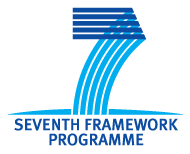WAI: Strategies, guidelines, resources to make the Web accessible to people with disabilities
W3C Home - WAI Home - WAI-ACT Project
Full Agenda
Referencing and Applying WCAG 2.0 in Different Contexts
W3C Workshop on 23 May 2013 in Brussels, Belgium
This Workshop is organized through the EC-funded WAI-ACT Project


Additional sponsors include:
This is the agenda for the W3C Workshop on Referencing and Applying WCAG 2.0 in Different Contexts. This is a preliminary agenda and might change slightly over the coming days; please look back for the latest version.
- 09:00 - 10:00 Registration (with continental breakfast)
- 10:00 - 10:10 Welcome and logistics - Shadi Abou-Zahra, W3C/WAI
- 10:10 - 10:30 Opening words and overview - Judy Brewer, W3C/WAI
- 10:30 - 12:00 Session I: Implementation Challenges (details below)
- 12:00 - 13:00 Lunch Break
- 13:00 - 14:30 Session II: International Harmonization (details below)
- 14:30 - 15:00 Coffee Break
- 15:00 - 16:30 Session III: Application of WCAG 2.0 (details below)
- 16:30 - 17:00 Summary of the day and closing - Judy Brewer, W3C/WAI
- 17:00 - 17:30 Afternoon Coffee (optional networking)
Description: What key factors contribute to implementation success of web accessibility and what are the challenges:
- What are the contributing factors to successful implementation of web accessibility?
- What are the contributing factors to delay in implementation of web accessibility?
- What role can accessibility policies play in influencing these contributing factors?
- Which resources help support implementation of accessibility; what else would help?
Chair: Dominique Burger, Association BrailleNet
Kick-Off Statement: Elin Emsheimer, EC DG Connect
Panelists:
- Alejandro Moledo del Rio, European Disability Forum (EDF)
- Susanna Laurin, Funka Nu AB
- Andrew Arch, AGIMO (teleconf)
- Piotr Witek, Fundacja Instytut Rozwoju Regionalnego
The session format is brief (~5 minute) statements from each panelist, then a short discussion lead by the session chair, followed by further perspectives and exchange with the workshop participants.
Description: Strategies and challenges in pursuing internationally harmonized uptake of web accessibility standards:
- Why is international standards harmonization important to your organization?
- What types of challenges are frequently encountered in achieving harmonization?
- What measures enable policies to roll-forward to the latest technical standards?
- Which resources help support harmonized take-up of standards; what else would help?
Chair: Donal Rice, Centre for Excellence in Universal Design, NDA
Panelists:
- Marsha Mazz & Bruce Bailey, US Access Board
- Inmaculada Placencia-Porrero, EC DG Justice
- Mike Pluke, Castle Consulting Ltd.
- Raph de Rooij, Logius
The session format is brief (~5 minute) statements from each panelist, then a short discussion lead by the session chair, followed by further perspectives and exchange with the workshop participants.
Description: The role of the WCAG 2.0 technical standard, its supporting documents, and accompanying WAI Guidelines:
- Role of the WCAG 2.0 technical standard, the techniques, and accessibility support
- Relationship between WCAG 2.0 and web technologies such as HTML5 and WAI-ARIA
- How does WCAG 2.0 and the other WAI Guidelines address web applications and mobile?
- Which resources and tools support implementation of WCAG 2.0; what else would help?
Chair: Joshue O'Connor, NCBI Centre For Inclusive Technology
Panelists:
- Michael Cooper, W3C Web Accessibility Initiative (WAI)
- Pirthipal Singh, Treasury Board of Canada
- Kiran Kaja, Adobe
- Loic Martínez-Normand, Universidad Politécnica de Madrid
The session format is brief (~5 minute) statements from each panelist, then a short discussion lead by the session chair, followed by further perspectives and exchange with the workshop participants.

